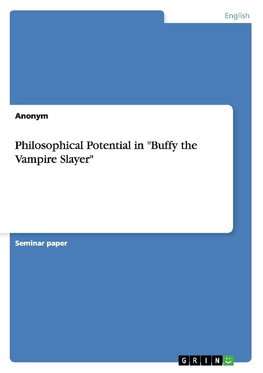
Philosophical Potential in "Buffy the Vampire Slayer"
Seminar paper from the year 2004 in the subject American Studies - Miscellaneous, grade: 1,7, Johannes Gutenberg University Mainz, language: English, abstract: The pop cultural TV series Buffy the Vampire Slayer (BtVS, 1997-2003), produced and directed by... Viac o knihe
Produkt je dočasne nedostupný
8.18 €
bežná cena: 9.30 €
O knihe
Seminar paper from the year 2004 in the subject American Studies - Miscellaneous, grade: 1,7, Johannes Gutenberg University Mainz, language: English, abstract: The pop cultural TV series Buffy the Vampire Slayer (BtVS, 1997-2003), produced and directed by Joss Whedon, definitely exceeds the movie Buffy the Vampire Slayer in 1992. Especially "Once More, with Feeling", a musical episode that very much differs from the rest of the series, is an extraordinary treasure in the history of television. In this, Joss Whedon self-ironically summits the developments from previous episodes and makes it a climax of the series.
Dawn's question: "Come on, songs, dancing around... what's gonna be wrong with that?" in the beginning of the musical episode as well as the knowledge that there is no day in Buffyverse that leads to hugs and puppies, has the viewer automatically suppose that this episode offers a meaning beyond pure entertainment. Sweet, the summoned dancing demon, forces the inhabitants of Sunnydale to sing their most intimate secrets to one another, and this - how else could it be - leads to chaos, desperation, and pain.
In this critical approach, an analysis of the musical episode's different layers of reality and fantasy will be given in order to prove that the highest fantastical level still deals with the most realistic issues of life. Only by recognizing the most fantastical layers as encrypted reality, it is understandable that in BtVS the Scooby Gang does not only kick ass but that the series, and especially this episode, carries high philosophical potential as well. In order to understand the different layers of reality and fantasy, it is necessary to make clear what this exactly means in the given context. As reality, we do not understand the perceptive faculty of the existing nature by the individual but by the public at large. In this approach, the audience's shared universal knowledge and everything which is considered as real will be defined as reality. In fact, the medium of television itself cannot be seen as pure reality any more; it reflects reality but can not be real. One often forgets that this medium is only a construction of reality: stories are created, plot lines are written down and developed...
- Vydavateľstvo: GRIN Verlag
- Formát: Paperback
- Jazyk:
- ISBN: 9783640763405



 Anglický jazyk
Anglický jazyk 
 Nemecký jazyk
Nemecký jazyk 

 Ruský jazyk
Ruský jazyk 



